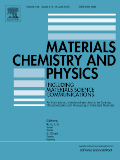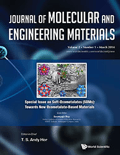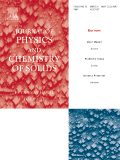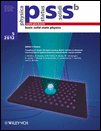
MATERIALS CHEMISTRY AND PHYSICS
metrics 2024
Shaping the Future of Materials through Rigorous Research
Introduction
MATERIALS CHEMISTRY AND PHYSICS is a leading peer-reviewed journal published by Elsevier Science SA, focusing on the intersection of materials science and condensed matter physics. With an esteemed impact factor and a distinguished reputation in its field, this journal holds a Q1 ranking in Condensed Matter Physics and a Q2 ranking in miscellaneous Materials Science categories as of 2023. Spanning over three decades since its inception in 1983, it provides a vital platform for researchers, professionals, and students to disseminate cutting-edge findings and innovations in materials characterization, properties, and applications. The journal is indexed in Scopus, boasting impressive rankings that reflect its commitment to publishing high-quality research. Although it does not currently offer an Open Access option, it remains an essential resource for those seeking to stay at the forefront of materials chemistry and physics.
Metrics 2024
 0.77
0.77 4.30
4.30 4.10
4.10 177
177Metrics History
Rank 2024
Scopus
IF (Web Of Science)
JCI (Web Of Science)
Quartile History
Similar Journals

JOURNAL OF MATERIALS SCIENCE-MATERIALS IN ELECTRONICS
Fostering Collaboration in Cutting-Edge Materials ScienceJOURNAL OF MATERIALS SCIENCE-MATERIALS IN ELECTRONICS, published by Springer, is a distinguished international journal that serves as a vital platform for the dissemination of cutting-edge research in the field of materials science, with a keen focus on electronics. Since its inception in 1990, this journal has consistently contributed to the advancement of knowledge across a range of interdisciplinary categories, including Atomic and Molecular Physics, Optical and Magnetic Materials, and Biomedical Engineering, achieving notable quartile positions in various 2023 Scopus rankings. With an impact factor that signifies its scholarly influence, this journal provides a rigorous peer-reviewed environment for researchers and practitioners to share innovative ideas, experimental findings, and theoretical developments. Although it does not currently offer open access options, the depth and breadth of topics covered—including condensed matter physics and bioengineering—make it an essential resource for those at the forefront of materials research. With a commitment to bridging the gap between theory and practical application, the JOURNAL OF MATERIALS SCIENCE-MATERIALS IN ELECTRONICS continues to pave the way for future explorations in the ever-evolving landscape of materials science.

Journal of Molecular and Engineering Materials
Unveiling the Future of Molecular and Engineering MaterialsThe Journal of Molecular and Engineering Materials, published by World Scientific Publishing Co Pte Ltd, is a leading peer-reviewed journal that focuses on the intricate relationship between molecular science and engineering practices. With the ISSN 2251-2373 and E-ISSN 2251-2381, this journal aims to foster the exchange of cutting-edge research and developments within the fields of materials science, molecular engineering, and related applications. Although the journal currently does not operate under an Open Access model, it remains a vital resource for researchers, professionals, and students seeking in-depth knowledge and innovative methodologies in material design and engineering. The journal's esteemed reputation is reflected in its commitment to publishing high-quality research that addresses contemporary challenges and opportunities in material science, thereby contributing to advancements in technology and industry.

Korean Journal of Materials Research
Connecting Ideas, Inspiring DiscoveriesKorean Journal of Materials Research is a pivotal publication in the field of materials science, offering a platform for innovative research and comprehensive reviews in miscellaneous materials applications. Published by the MATERIALS RESEARCH SOC KOREA, this journal has been a valuable resource since its inception in 2007 and continues to disseminate vital findings through 2024. Although currently categorized in Q4 of the Materials Science quartiles, the journal is committed to advancing knowledge and fostering research collaboration within the scientific community. With an ISSN of 1225-0562 and an E-ISSN of 2287-7258, the journal aims to bridge gaps in research and practice, appealing to a diverse audience of researchers, professionals, and students interested in the latest advancements in materials science. While access to content may not be open, the journal's impact in the regional and global research landscape is steadily growing, as indicated by its Scopus ranking in the 7th percentile of General Materials Science. Engage with the Korean Journal of Materials Research to stay at the forefront of materials innovation!

JOURNAL OF PHYSICS AND CHEMISTRY OF SOLIDS
Bridging Physics and Chemistry for a Sustainable FutureJOURNAL OF PHYSICS AND CHEMISTRY OF SOLIDS, published by Pergamon-Elsevier Science Ltd, is a distinguished international journal that has been at the forefront of disseminating cutting-edge research in the fields of physics, chemistry, and materials science since its inception in 1956. This journal, which is recognized for its high impact in the Q2 category across multiple subjects—including Chemistry (miscellaneous), Condensed Matter Physics, and Materials Science—serves as a vital platform for researchers, professionals, and students to engage with significant advances in solid-state physics and chemistry. With Scopus rankings placing it in the top 15% of its field across various domains, the journal plays a crucial role in shaping the scientific dialogue surrounding materials properties, synthesis, and applications. Although it does not currently offer open access options, the presented research is widely recognized for its quality and relevance, ensuring that published works contribute meaningfully to ongoing scholarly discussions.

Crystals is a premier open-access journal, published by MDPI since 2011, that focuses on the multidisciplinary fields of chemical engineering, condensed matter physics, inorganic chemistry, and materials science. With its E-ISSN 2073-4352, the journal is headquartered in Switzerland, and actively contributes to the global scientific community by facilitating the dissemination of high-quality research. Ranking in the Q2 quartile across multiple categories, including Chemical Engineering (miscellaneous) and Materials Science (miscellaneous) for 2023, Crystals provides a platform for innovative studies that span from fundamental research to practical applications. The journal's commitment to open access ensures that groundbreaking findings are readily available to researchers, professionals, and students alike, fostering an environment of collaboration and knowledge sharing that is essential in advancing the scientific understanding of crystalline materials.

APPLIED PHYSICS A-MATERIALS SCIENCE & PROCESSING
Transforming Ideas into Materials BreakthroughsApplied Physics A: Materials Science & Processing, published by Springer Heidelberg, is an esteemed academic journal that has been at the forefront of innovative research since its establishment in 1995. With a strong focus on the intersection of physics, materials science, and engineering, this journal explores cutting-edge developments and applications that influence contemporary materials research. Categorized in the Q2 quartile across both Chemistry and Materials Science, it boasts respectable rankings in Scopus, affirming its influence and reach within the academic community. Although primarily a subscription-based journal, it is dedicated to disseminating high-quality research findings that advance our understanding in these fields. Researchers, professionals, and students alike can benefit from the journal's commitment to publishing comprehensive studies, methodological advancements, and insightful reviews that push the boundaries of knowledge in materials science.

JOURNAL OF MATERIALS SCIENCE
Elevating Understanding in Materials ScienceJOURNAL OF MATERIALS SCIENCE, published by SPRINGER, stands as a highly regarded periodical in the field of materials science, delivering impactful research since its inception in 1966. With an impressive Q1 ranking in both Mechanical Engineering and Mechanics of Materials, alongside strong Q2 positions in Ceramics, Composites, and General Materials Science, this journal serves as a pivotal resource for scholars and practitioners alike. It offers insightful contributions that span a diverse range of topics, from emerging materials to advanced applications in engineering. With a robust Scopus ranking reflecting its global influence—ranking 91 out of 672 in Mechanical Engineering and 63 out of 398 in Mechanics of Materials—the JOURNAL OF MATERIALS SCIENCE maintains an essential role in advancing the understanding and innovation within the discipline. Researchers, professionals, and students are encouraged to access this esteemed journal to keep abreast of groundbreaking findings and methodologies that shape the future of materials science.

PHYSICA STATUS SOLIDI B-BASIC SOLID STATE PHYSICS
Fostering Insights into the Heart of Material SciencePHYSICA STATUS SOLIDI B-BASIC SOLID STATE PHYSICS, published by Wiley-VCH Verlag GmbH in Germany, is an esteemed journal within the condensed matter physics sphere, covering pivotal advancements in basic solid state physics. With a rich history dating back to 1961, it serves as a scholarly platform for researchers, professionals, and students alike, providing insights into the fundamental properties and applications of electronic, optical, and magnetic materials. The journal currently holds a respectable Q3 ranking in both Condensed Matter Physics and Electronic, Optical, and Magnetic Materials as of 2023, indicating its impactful contributions to these fields despite its competitive landscape. While it does not offer open access, its comprehensive research findings are critical for those engaged in innovative material science research. With a convergence period extending to 2024, PHYSICA STATUS SOLIDI B continues to play a significant role in facilitating knowledge exchange and fostering advancements in solid state physics.

APL Materials
Connecting researchers to the forefront of materials innovation.APL Materials is a prestigious open access journal published by AIP Publishing that has been at the forefront of disseminating cutting-edge research in the fields of materials science and engineering since its inception in 2013. With an impressive impact factor reflecting its significance, APL Materials ranks securely in the Q1 quartile in both Engineering (miscellaneous) and Materials Science (miscellaneous) categories, underscoring its role as a vital resource for innovative scientific inquiry. Ranked highly in Scopus, particularly in General Engineering (24/307) and General Materials Science (78/463), the journal provides a platform for researchers, professionals, and students to share their findings and advancements that push the boundaries of material applications. Furthermore, its open access policy ensures that high-quality research is freely available to a global audience, fostering collaborative advancements in the scientific community. As the journal continues to evolve through to 2024, it remains committed to presenting groundbreaking studies that contribute to the advancement of materials science and engineering disciplines.Explore APL Materials to stay at the cutting edge of research and innovation.

Materials Today Communications
Connecting Innovators in Materials Science and BeyondMaterials Today Communications, published by ELSEVIER, stands as a prominent platform within the fields of Materials Chemistry, Materials Science, and Mechanics of Materials. With an open access format, this journal facilitates global dissemination of knowledge, aimed at enhancing collaboration and innovation among researchers, professionals, and students worldwide. Established in 2014 and converging through 2024, the journal has rapidly ascended through the ranks, achieving a commendable Q2 category status in multiple relevant categories. Specifically, its Scopus rankings highlight its influence, with rankings in the 64th to 69th percentile in various materials science domains. A key resource for those engaged in cutting-edge materials research, Materials Today Communications provides insightful coverage of contemporary advancements, bridging the gap between theoretical exploration and practical application.